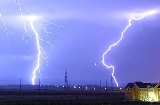
Energy
Energy is a fundamental concept in physics that is often defined as the capacity to do mechanical work — a definition disputed by many physicists. It also has a specific connotation of the forms of energy used for powering technological society.
Sourced
- It is important to realize that in physics today, we have no knowledge what energy is. We do not have a picture that energy comes in little blobs of a definite amount.
- Richard Feynman, in The Feynman Lectures on Physics (1964) Volume I, 4-1
- Hold somebody's hand and feel its warmth. Gram per gram, it converts 10 000 times more energy per second that the sun. You find this hard to believe? Here are the numbers: an average human weighs 70 kilograms and consumes about 12 600 kilojoules / day; that makes about 2 millijoules / gram.second, or 2 milliwatts / gram. For the sun it's miserable 0.2 microjoules / gram.second. Some bacteria, such as the soil bacterium "Azotobacter" convert as much as 10 joules / gram.second, outperformung the sunby a factor 50 million. I am wam because inside each of my body cells there are dozens, hundreds or even tousands of mitochondria that burn the food I eat.
- Gottfried Schatz, in "Jeff's view on science and scientists", Amsterdam, Elsevier Butterworth-Heinemann, 2006, ISBN 978-0-444-52133-0, ISBN 0-444-52133-X (pbk.), p. 43, "The tragic matter"
Unsourced
- For those who want some proof that physicists are human, the proof is in the idiocy of all the different units which they use for measuring energy.
- Richard Feynman
- The energy produced by breaking down the atom is a very poor kind of thing. Anyone who expects a source of power from the transformations of these atoms is taking moonshine.
- Ernest Rutherford
- If you take a bale of hay and tie it to the tail of a mule and then strike a match and set the bale of hay on fire, and if you then compare the energy expended shortly thereafter by the mule with the energy expended by yourself in the striking of the match, you will understand the concept of amplification.
- William Shockley
- You will soon be able to tax it.
- Michael Faraday to William Gladstone on the future use of electricity
- Higher energy prices act like a tax.
- John W. Snow
